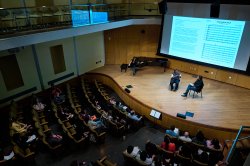Curriculum
Focusing on development of cutting-edge creativity, our Composition students and faculty create music spanning a wide range of genres like contemporary classical music, jazz, songwriting, musical theatre, electronic music, and media scoring. The program cultivates professional-level skills through courses in compositional technique, music technology, orchestration, contemporary repertoire, advanced analysis, and more. Private lessons in every year of study allow students to dig deeper into their creative voice, culminating in an individualized showcase that goes beyond a traditional recital by using formats like multimedia performances of concert music, semi-staged productions of theatrical work, sound art installations, albums released publicly on Spotify or Bandcamp, or screenings of virtual instrument film scores.
Creative Opportunities
In our program’s unique long-term “creative incubator” process, students create music annually for world class guest artists including Grammy winning multi-genre chamber music groups like Kronos Quartet and Time for Three, Pulitzer Prize winning songwriters Rhiannon Giddens and Caroline Shaw, choral ensembles Voces8 and Roomful of Teeth, electronic beatmaker JLin, and banjo virtuoso Bela Fleck, as well as Cali School ensembles like the Montclair State University Orchestra, New Music Ensemble, Vocal Accord, Jazz Ensemble, and Cali Collective. In addition, we regularly offer interdisciplinary projects with other campus programs, like writing for the Musical Theatre New Works workshop, creating music for dance artists on Montclair’s elite Peak Performance series, or scoring student films and other video media. Every year, outstanding student work also receives encore presentations in places like Merkin Hall in Manhattan, or Brooklyn’s premiere contemporary music venue National Sawdust.
Alumni Success
In addition to further studies in places like PhD programs at Columbia University and the Peabody Institute of Music, Manhattan School of Music’s jazz composition program, and New York University’s Tisch School of the Arts in film scoring and musical theatre writing, recent alumni have gone immediately into professional work for music production companies, recording studios, music publishers, touring ensembles, and teaching at community music schools. Through collaborations with Immersive Artist Residency guests and international music festivals, the music of both current students and graduates is regularly performed throughout the world.
Bachelor of Music (BMus)
For degree requirements, see the Undergraduate Catalog program listing
Master of Arts (MA)
For degree requirements, see the Graduate Catalog program listing
Contact
Aaron Helgeson
Associate Professor
Composition
Theory/Aural Skills
helgesona@montclair.edu
